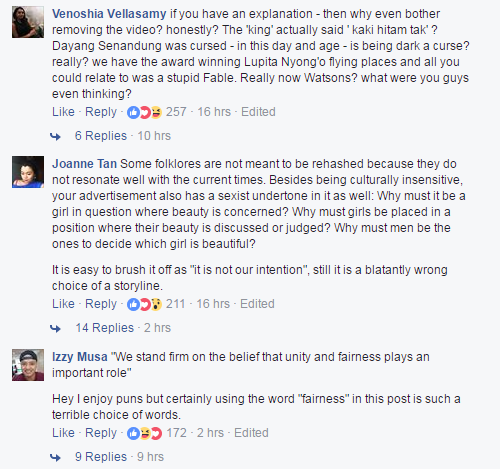Watsons Malaysia's 'blackface' ad is awful in so many ways, we don't know where to start

In this day and age of globalisation, one would think that advertisers and marketers know better than to use blackface in their media content, which is the use of makeup to impersonate a dark-skinned character.
It has long been frowned upon as offensive due to its historical usage in caricatures and negative portrayals of black people.
However, Watsons Malaysia apparently missed the memo, with its latest "Legenda Cun Raya" campaign ad portraying a lady with a black face as unattractive enough to shock the male lead into gasping out loud and saying, "She is actually dark?"
Yes, that's an actual line from the 15-minute ad.
[embed]https://www.facebook.com/TheRakyatPost/videos/1574314805920634/[/embed]
But we're getting ahead of ourselves, because that line is merely the icing on the cake.
By the way, the ad is about princesses and beauties auditioning to impress a rich merchant named Al-Kazam (played by Kamal Adli), who is searching for a mysterious girl whose beautiful voice keeps appearing in his dreams.
Al-Kazam is smitten by the voice of one girl (played by Nur Ruhainies) and says, "I think your face must be as beautiful as your voice. Show me your face."
When the girl uncovers her face to reveal her black face - with ominous music in the background, no less - Al-Kazam exclaims, "Oh my gossssh." An audible gasp also ripples through the crowd of people present in the room.
Al-Kazam then asks, "Where are the lights?" A moment later, he then says in confusion, "She is actually dark?"
Wow, way to realise that people with dark skin actually exist, Al-Kazam! And by extension, Watsons Malaysia!
The ad doesn't stop there, though. Al-Kazam eventually chooses the mysterious girl as the winner.
To everyone's astonishment, she then reveals her fair complexion, explaining that it was a test of Al-Kazam's sincerity. The video is even edited to make her seem like she is glowing.

What better way to perpetuate the "fairer complexions are better" stereotype, right?
Naturally, netizens were enraged at the portrayal of blackface in the ad.
[embed]https://twitter.com/mrymler/status/872372259008245760[/embed]
[embed]https://twitter.com/shobayyamani/status/872352210268696576[/embed]
[embed]https://twitter.com/nocturnaltapir/status/872468000066084865[/embed]


Watsons Malaysia has since removed the video from both its Facebook and Youtube channels, and also issued an official apology that has been slammed as insincere and as a 'non-apology'.
[embed]https://www.facebook.com/watsonsmalaysia/posts/10156176552259409?match=d2F0c29ucyBtYWxheXNpYQ%3D%3D[/embed]
In the apology, Watsons Malaysia wrote that the video was inspired by a Malay folk tale about a lady who was "cursed with black skin but blessed with a beautiful voice". The curse was lifted after she bore the king's child.
It added: "We stand firm on the belief that unity and fairness plays an important role, and we respect people from all nationalities. The video was shot to highlight the Legend and its moral values of inner beauty and that true love exists. We are sorry that some of our fans feel offended by the video which was not our intention."
In response, netizens noted that Watsons did not sound apologetic for the use of blackface at all, and instead seemed to be sorry that its fans had taken offence to the ad.
[embed]https://twitter.com/RealSClarke/status/872432134274899968[/embed]


Watsons' competitor Guardian Malaysia posted a similar ad on Facebook on Tuesday (Jun 6), which depicts a story where a shy lady with a beautiful voice saves a prince. However, she is not seen as beautiful due to the blemishes on her skin.
Nonetheless, the prince in the Guardian ad is unaffected by her looks, and says that a pure heart is more important. He then reassures her that they can buy products from Guardian to help treat the blemishes. The difference in delivery has earned the Guardian ad praise, in stark contrast to how Watsons' ad was received.
Last October, Singaporean online video streaming service Toggle also came under fire for its use of blackface on an episode of Chinese-language series "I Want To Be A Star".
We can't help but wonder: how difficult is it for content creators to realise that blackface is unacceptable under all conditions?
pariel@sph.com.sg